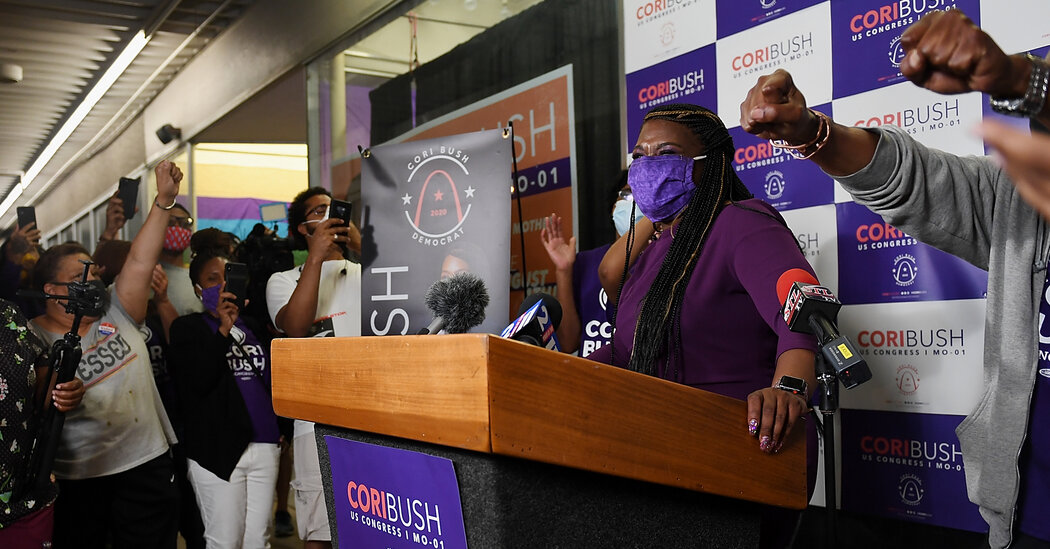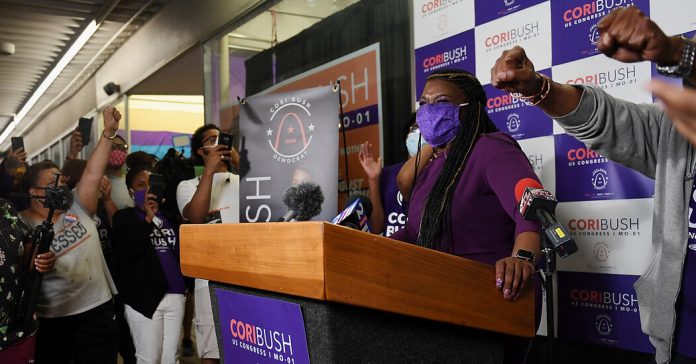
When Bernie Sanders lost to Joseph R. Biden Jr., the left mourned what could have been, worried that it had faltered at a once-in-a-generation crossroads for the Democratic Party.
But in the time since Mr. Sanders dropped out of the 2020 presidential race in early April, progressives have had a number of victories to celebrate, in Missouri, New York, Michigan and Illinois — congressional primary triumphs that demonstrate a new path for building political power and grass-roots momentum that threatens the position of longtime Democratic leadership.
This week, the progressive activist Cori Bush defeated Representative William Lacy Clay Jr. of Missouri, a 10-term incumbent and member of a powerful political dynasty that had represented the St. Louis area for more than 50 years. Representative Rashida Tlaib of Michigan also cruised in her primary against the more moderate Detroit City Council president, proving the staying power of the group of progressive congresswomen known as the “Squad.”
Earlier primary contests led to other victories for the left: Jamaal Bowman, a former middle school principal, ousted the longtime incumbent Representative Eliot L. Engel in the Bronx and Westchester, the progressive lawyer Mondaire Jones won a House primary for an open seat in New York’s Rockland County, and Marie Newman defeated an anti-abortion Democrat in Illinois. And so what began for the party’s left wing as a year of “what could’ve been” is turning into a promise of “what can be,” as the successes provide a new road map of political possibilities.
On its own, the outcome of the Democratic presidential primary would point to a party that has rejected left-wing ideals, eschewing “Medicare for all” and its champions in favor of a more moderate candidate, Mr. Biden. But the full scope of this year’s primary season points to a more complicated picture — a party with a fluid identity whose embrace of diverse candidates is clear, but one that has not settled on a dominant ideology.
Mr. Sanders, the Vermont senator whose presidential campaigns in 2016 and 2020 ignited much of the current grass-roots infrastructure, announced he would hold a livestream event on Wednesday evening with Ms. Tlaib, Ms. Bush and Mr. Bowman, something of a virtual torch-passing to the next wave of political revolutionaries. Representative Alexandria Ocasio-Cortez, who did not endorse a candidate in the Missouri race but is the best-known member of the House progressives, called Ms. Bush Wednesday to congratulate her.
“People are ready to elect people who they see actually doing the work,” Ms. Bush said in an interview. She dismissed the idea that making a transition from outside activist to congresswoman would be difficult.
“I’m an organizer at heart, so if we need to be in the streets, I will be in the streets,” said Ms. Bush, whose district is solidly Democratic. “That part of Cori won’t change. I am still a boots-on-the-ground type of person.”
If Ms. Bush’s stunning upset over a Black incumbent on an explicit message of racial justice shows a new path forward for Democratic challengers, then Ms. Tlaib’s successful push toward re-election proves that such grass-roots candidates have some staying power — not achieving one-off wins, but building a strong movement.
Ms. Tlaib had become a favorite target of conservative opponents since her slim victory in 2018, and had at times run afoul of House Democratic leaders. But she won by a comfortable margin Tuesday, a sign that she has established herself locally as an effective legislator.
In Washington, Ms. Tlaib’s and Ms. Bush’s victories had the effect of sending a clear message to those who still doubted: The Squad and its allies are resilient.
Two more contests in the coming month will bring further clarity to the Democratic Party landscape, as Representative Ilhan Omar of Minnesota, another Squad member, faces a well-funded primary opponent next week. And on Sept. 1 in Massachusetts, Alex Morse, a 31-year-old mayor who has support from progressive groups like Justice Democrats, is looking to unseat Representative Richard E. Neal, the chairman of the powerful House Ways and Means Committee.
Alexandra Rojas, the executive director of Justice Democrats, said the coronavirus pandemic and the national protests over racial inequality had given voters a sense of urgency that aligns with the big ideas progressives have long pushed.
“Movements like ours tend to spark up when there’s something seriously wrong, and the pandemic highlighted that even more,” she said. “It is so clear to people we need to change something, and change something fast.”
Mr. Bowman, who is expected to be elected to Congress in November in a safe Democratic district, said he was convinced the country and the party were moving left.
“The country is ready to become more progressive, and it is becoming more progressive,” he said. “The country is tired of Democrats taking corporate money. They don’t understand how someone can be in office 10 or 20 or 30 years and they’re struggling with housing and jobs and criminal justice.”
This does not mean that the progressives are without challenges, or that their current ascension in the Democratic Party is linear or inevitable. Incumbents have beaten back progressive challengers in Ohio, New York and Texas this year, and Mr. Biden’s victory ensures that a moderate voice will lead the party at least for the near future.
Some Democrats also believe the grass-roots energy is a consequence of the unique political environment, with liberals’ anger toward President Trump supercharging fund-raising and political interest in a way that could dissipate in the future.
In an interview this spring, Representative Gregory Meeks of New York, the head of the Congressional Black Caucus’s political arm, dismissed the idea that an influx of new representation would be a reason to adjust the caucus’s electoral strategy. The group almost exclusively endorses incumbents, even when they are running against Black challengers. This has led it to be on the wrong side of some recent progressive victories, including those by Representative Ayanna Pressley of Massachusetts, Mr. Bowman and now Ms. Bush.
“There’s many other races that went the other way and the incumbent won,” Mr. Meeks said. “It’s about the record of the person while they were in Congress and the relationships they have with the African-Americans they represent. That’s what we think is important.”
That speaks to how a growing left-wing movement could further alter the balance of power among Washington Democrats, on Capitol Hill and potentially in a Biden administration. More than simply being left of party leaders on the ideological spectrum, those in the new crop of House leftists have an inside-outside view of political power and are open to pushing their party publicly if they deem the tactic necessary.
The Congressional Progressive Caucus in the House, though large in number, has rarely had enough members willing to buck party leadership, a key point of distinction between it and the famed Freedom Caucus, the collection of House Republicans who often pressure their party to be more conservative.
But the newly elected progressives make no secret of their willingness to upend tradition, which could make them a policymaking force to be reckoned with. They will also have a meaningful say in who succeeds Speaker Nancy Pelosi as the House Democratic leader when she eventually retires, and on what tone that person sets for the party.
When Ms. Ocasio-Cortez and others arrived on Capitol Hill, in 2019, they rubbed uncomfortably against the House Democratic caucus in ways big and small. In a body built around waiting one’s turn — seniority still determines major committee assignments — many rank-and-file lawmakers viewed Ms. Ocasio-Cortez’s sit-in in the speaker’s suite and her willingness to challenge Ms. Pelosi over policy as disrespectful provocations.
But Ms. Bush and Mr. Bowman are likely to bring a similar activist energy to Congress. Their arrival will probably further stoke tensions between national progressives and the tight-knit Congressional Black Caucus.
Before Tuesday’s primary, Mr. Clay had explicitly accused Ms. Bush and Justice Democrats of targeting Black Caucus members “because they think we are easy targets.” His claim is not factually supported — the group targeted just two Black incumbents and backed Black challengers in both races — but it is not an uncommon view on Capitol Hill among older Black lawmakers who sit atop the party hierarchy.
Ms. Bush said her victory should dispel any notion that Black communities are not tolerant of primary challenges or progressive policies.
“I don’t care what you look like or what group you’re a part of,” she said.
Mr. Bowman flatly rejected the idea that Black elected officials should be shielded from progressive pressure.
He paraphrased a quotation from the rapper Chuck D: “Every brother ain’t a brother. So it’s not just about being a member of the Congressional Black Caucus, but standing up and fighting for your people.”
In the Massachusetts House race, Ms. Pelosi released an advertisement on Wednesday for Mr. Neal, in a sign of how seriously Democratic leaders are taking the race. The same day, Mr. Morse, the mayor of Holyoke, Mass., issued a memo laying out his path to victory. Its title: “Why Richard Neal Is Next.”
Nicholas Fandos contributed reporting from St. Louis.
The post Progressive Victories Signal Staying Power for the Movement appeared first on New York Times.







